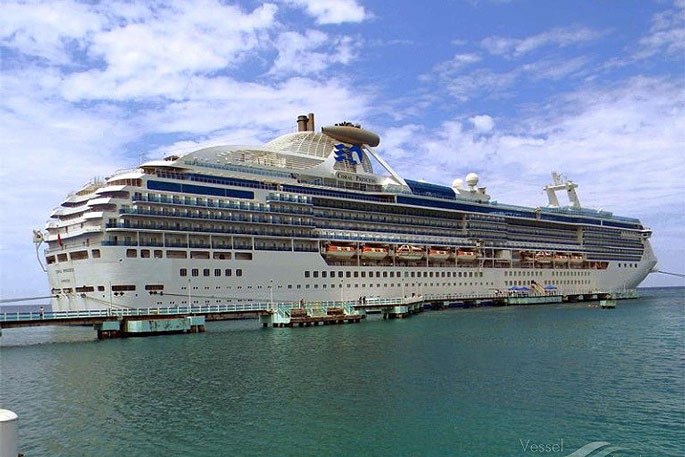The Coral Princess's journey around the country's tourist hotspots hit a snag when snails were detected in the ship's discharge pipes.
The cruise was meant to begin with a view of Mitre Peak, but instead passengers are spending another two days at sea – on top of the three-day journey from Brisbane.
The ship was not allowed to sail into the Milford Sounds, where it was entering the country, because of the snails.
Instead it rerouted up around Cape Reinga and over to the eastern coast of New Zealand.
The cruise ship is now sitting 77km off the coast of Tauranga, out of the country's territorial waters, while it is cleaned by divers and the snails removed.
Passenger Christine McDonald says the reaction on board has been 'overwhelmingly negative”, but she's glad the 'precious and pristine” sounds in Fiordland are protected.
Some Australian passengers blame New Zealand's 'ridiculous OTT environmental rules”, but 'most rational passengers are dismayed with the cruise line for failing to have a clean hull in view of their advertised itinerary”., McDonald wrote in an email.
'We imagine [the cleaning] has been a major logistical exercise for the cruise company organising a dive team the week before Xmas and finding a safe place (given weather and wind) to carry out the hull clean outside NZ territorial waters ...
'However good news for our precious and pristine Fiordland sounds.”
There are close to 2000 passengers on board the ship, she estimates. She has been on the ship for a week, with just one stop in Brisbane after boarding in Auckland on December 15.
Fiordland and Dunedin's Port Chalmers were dropped from the cruise's itinerary to allow time for the cleaning – instead it will sail directly to Christchurch on Christmas Day.
The Ministry of Primary Industries confirmed the ship was turned away from Milford Sound because of biofouling – the name given to plants, animals, or micro-organisms growing on a ship's hull.
The Coral Princess 'has been directed to resolve a biofouling issue because of high-risk live organisms (snails) in its discharge pipes”, says Paul Hallett from Biosecurity NZ.
Ships being turned away for dirty hulls was not uncommon, he says.
About six per cent of international ships have been told to clean their hulls before entering the country since January 2020.
The rules are in place because most marine pests arrive on the 'submerged surfaces” of international ships.
'We have some of the highest biofouling standards in the world. The standards were introduced in 2018 and vessel operators know they must meet them or risk not being able to enter our waters or unique areas during their journey.”



3 comments
Well done MPI!!!
Posted on 23-12-2022 07:58 | By fair game
Good detection of a much unwanted pest. As with any holiday, they are risks attached - delays, lost luggage, illness and accident, even death. If this is the worst that could happen to them it's not all that bad really. The Australians could always swim home.....
Typical, always NZ's fault for keeping clean
Posted on 23-12-2022 10:57 | By tish
"Some Australian passengers blame New Zealand’s “ridiculous OTT environmental rules”
Interesting
Posted on 23-12-2022 13:22 | By Kancho
How were the snails found ? Seems the ship may have self reported ? as it couldn't be while at sea coming here? Can't imagine why it would not be checked in the Port in Australia before heading our way knowing the strict contol ? Costly for the cruise line as well as very disaappointing to miss the highlight of the visit
Leave a Comment
You must be logged in to make a comment.